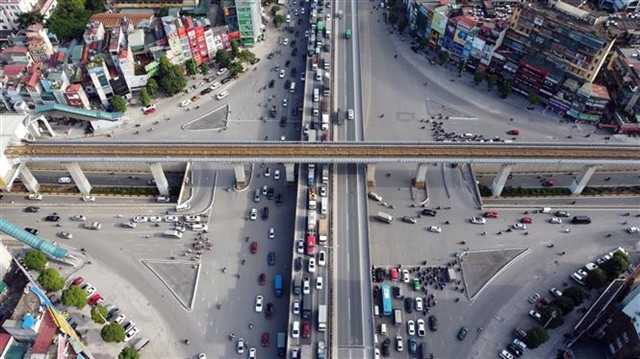 |
Businesses and individuals seeking to profit from land and property investments in areas near infrastructure projects have been warned about the risks of committing before the full project details become clear.
Recently, the planning of Ring Road No 4 in the capital city of Hà Nội became the focus of investors' attention as land prices in areas where the road is going to run through kept rising dramatically.
The resolution on investment policy for the project of Ring Road No 4 got the nod from the National Assembly in June. The project would build a 112.8 km–long elevated road with an estimated investment of VNĐ85 trillion (US$3.65 billion) in the first phase, which would link several industrial zones, clusters, urban areas, provinces and cities.
Composed of seven component projects, Ring Road No 4 was expected to promote the development and investment of real estate projects in surrounding areas.
Nguyen The Diep, Deputy President of Hanoi Real Estate Club, said that traffic infrastructure plays an important role in socio-economic development, adding that where traffic infrastructure was developed, the economy, urban development and the real estate market also benefit.
The facts show that land prices increase when infrastructure systems are constructed or expanded, he said.
Thanh Hang, who lives in Kim Ma, Hanoi, said that she invested in land in Me Linh District and currently the price is around 40 per cent higher than the original purchase price. Like other investors who invested to go ahead of the infrastructure wave, Hang expects land prices to continue to increase during the implementation of the infrastructure project.
As well as Me Linh, Soc Son, Thuong Tin and Hoai Duc districts also saw rapid increases in land prices.
When the news broke that Ring Road No 4 would pass in between Dien Phuc Pagoda and Gie Sen Temple in Hoai Duc District, land prices in this area rose from VNĐ20-30 million per sq.m to VND30-50 million.
Although Ring Road No 4 will provide impetus to the real estate market in the regions it passed through, there are many potential risks too, as investors do not know the exact details of the planning, experts said.
President of the Vietnam Association of Realtors Nguyen Van Dinh said that newly built or expanded transport infrastructure brings significant value to the neighbouring real estate market.
However, in some cases, the information about the market is just a trick to create a market wave, Dinh said, adding that investors should be very cautious and learn about the planning and liquidity carefully, to avoid the risk of losing money.
Investors should understand two factors before deciding to invest; the room for price increases and the progress of the infrastructure construction, Dinh said.
He said that some areas where Ring Road No 4 ran through saw significant price increases during the past year, adding that a new price level has been established and it is quite high.
There was still room for price increases in these areas but investors should not expect too much, Dinh said.
According to Do Thu Hang, senior director, Consulting and Research Development, Savills Hanoi said that transport infrastructure work was often implemented over many years, so investors need to understand the planning and the completion progress of component projects to make investment decisions.
Hang said that in areas where the infrastructure projects had not been completed or put into operation, real estate prices were still likely to be adjusted.
For example, Ring Road No 4 is a large-scale project that is divided into seven component projects with different implementation progress, Hằng said, adding that this was one of the important factors in helping investors determine the reasonableness of land prices in certain areas.
Investors should also pay attention to the legal conditions of the property assets to ensure liquidity and avoid conflicts, she added.
Deputy Minister of Construction Nguyen Van Sinh in an interview in April this year said that it was necessary to make public planning information, as well as implementation progress of projects, to ensure market transparency and prevent rumours and speculation, which inflates prices unreasonably.
Source: VNS